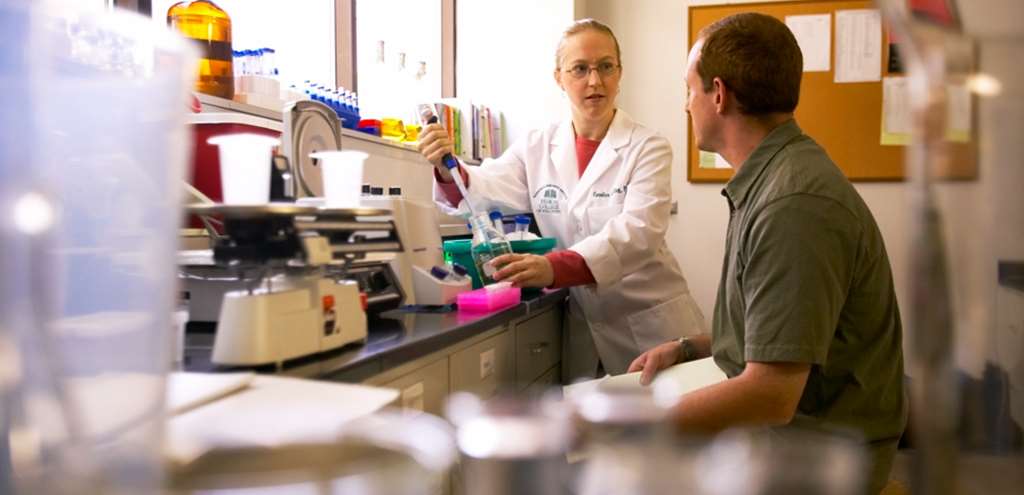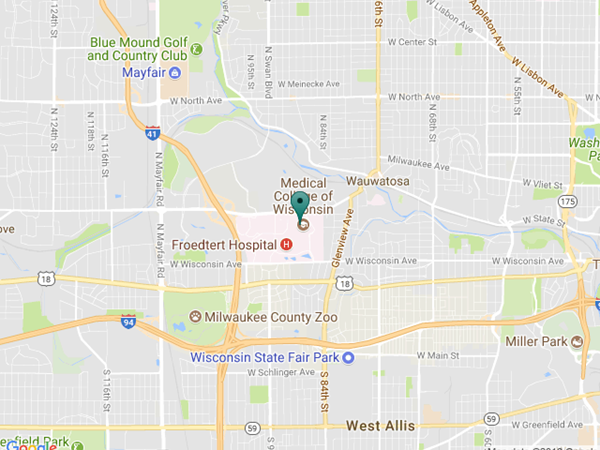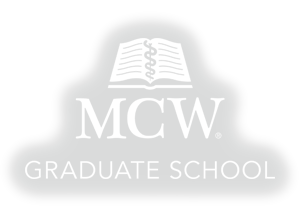Biophysics Graduate PhD Program at the Medical College of Wisconsin

Message from the Director

Neil Hogg, PhD
Professor of Biophysics
Director, Graduate Program in Biophysics
nhogg@mcw.edu
(414) 955-4012
“Thank you for your interest in Biophysics at MCW! Our graduate program focuses on two magnetic resonance techniques with clinical and biomedical applications: we are the birthplace of functional magnetic resonance and pioneers in the development of electron paramagnetic resonance spectroscopy instrumentation and applications. Our program faculty are enthusiastic about their research, and our environment may be the ideal place to fulfill your graduate career goals—explore more about what our program has to offer below.”
About the Program
About the Biophysics Graduate Program
The Biophysics Graduate Program features two primary areas of research: Magnetic Resonance Imaging and Molecular Biophysics. Our program is designed to assist young scientists in developing the research skills they need to thrive in academic and clinical settings. Our program offers an informal atmosphere where students are able to work closely with faculty members, as well as other graduate students and postdoctoral fellows.
Magnetic Resonance Imaging
The Magnetic Resonance Imaging track places particular emphasis on magnetic resonance imaging (MRI). A particularly active area of research is functional MRI (fMRI) of the human brain (e.g., neuroscience, contrast mechanisms, technical development), which is the measurement of the indirect consequences of locally increased neural activity—increased blood flow and increased blood oxygenation, both confined to the region near the neural activation. Our fMRI program emphasizes the following:
- The development and application of faster imaging methods, with a principal application of mapping human brain function (fMRI);
- The quantitation of clinically relevant imaging parameters such as differential relaxation times in cancerous and normal brain tissues, which can aid in the diagnosis of cancerous tissue; and
- The development of more rigorous mathematical and statistical techniques for modeling and analyzing MRI and fMRI experiments. Fourier image reconstruction and computing of statistical activations are integral parts of MRI/fMRI.
Research also focuses on the basic physics and mechanisms of MRI. Designing improved hardware, experimental protocols and post-processing algorithms is key to achieving the goals of this program.
Research directions that stem from these goals include:
- Creating new, faster imaging techniques and hardware
- Understanding the precise interaction between basic neural events, their physiological consequences (e.g., blood oxygenation changes) and the nuclear magnetic resonance (NMR) signal
- Developing new mathematical and statistical models for Fourier image reconstruction and the precise quantification of activations in structure-function relationships
Instrumentation for fMRI research is maintained by the Center for Imaging Research.
Students interested in fMRI research are encouraged to apply directly to the Biophysics Graduate Program or enter our program through the Neuroscience Doctoral Program (NDP).
Molecular Biophysics
The Molecular Biophysics track encompasses the investigation, detection and use of free radicals and paramagnetic metal ions in biological systems using electron paramagnetic resonance (EPR) spectroscopy.
- Free radicals are an integral part of cellular communication and are also involved in many disease processes (e.g., atherosclerosis and Lou Gehrig's disease).
- Stable free radicals can be introduced at any site in a protein or peptide by a technique known as site-directed spin labeling. Free radicals are excellent reporters of their environment and, therefore, can be used to investigate protein structure and functional dynamics.
- Paramagnetic metal ions are central to most biological processes and electron transfer systems.
Research in the Department of Biophysics focuses on:
- The study of nitric oxide, a free radical involved in the control of blood pressure, memory and inflammation
- Understanding the role of oxidants and antioxidants in signal transduction and apoptosis
- Site-directed spin-labeling studies of bacterial toxins, mammalian receptors, essential bacterial transport proteins and other biomedically relevant proteins, peptides and lipid membranes
- Investigating the function of biological membranes and the effects of cholesterol, macular carotenoids and integral membrane proteins on their properties
- Biomedically important metal-ion-containing proteins such as superoxide dismutase, a free-radical-scavenging enzyme that contains an active-site copper
- The development of advanced EPR instrumentation and new EPR methodologies
The Department of Biophysics houses the National Biomedical EPR Center, one of the few national centers for EPR-related research, as well as the Free Radical Research Center and the Redox Biology Center.
Students interested in the biomedical application of EPR spectroscopy to the study of biology, biochemistry and structural biology should enter our program through the Interdisciplinary Program (IDP) in Biomedical Sciences. Students with more of a physical background who are interested in specializing in EPR instrumentation development should apply directly to the Biophysics Graduate Program.
Curriculum
Magnetic Resonance Imaging (fMRI)
In the Magnetic Resonance Imaging track, students will take the following core courses in the first two years of entering the program:
- Functional MRI Contrast Mechanisms and Applications
- Functional MRI Journal Club
- Nuclear Magnetic Resonance
- Seminar
During a student's first two years, courses in biophysics, biostatistics and a biomedical science are taken in combination to complement the student's strengths and interests and as needed for their research direction. This allows students to gain experience in both technical and applied areas. Since students' time is not occupied by teaching requirements, they will be involved with a research area under the direction of a faculty member. Students typically coauthor several refereed journal publications prior to graduation. Directed studies and research courses are available to students, as are classes at two area universities: Marquette University and University of Wisconsin-Milwaukee.
A written comprehensive qualifying exam and oral dissertation proposal defense are expected to be completed by the middle of the third year of the program. A final dissertation defense is expected to occur by the fifth year of study.
Molecular Biophysics
In the Molecular Biophysics track, students will take the following courses in the first two years of entering the program:
- Advanced Protein Chemistry or Free Radicals in Biology
- Biochemistry of the Cell
- Biophysical Techniques in Biochemistry
- Cell Signaling
- Electron Paramagnetic Resonance Spectroscopy (Theory and Practical Applications)
- EPR Journal Club
- Genetics
- Molecular and Cellular Biology
- Seminar
- Techniques in Molecular and Cellular Biology
In addition to the introductory core classes listed above, students have the opportunity to take more advanced classes specific to their chosen area of research. A qualifying exam and dissertation proposal defense are expected to be completed by the middle of the third year of the program. A final dissertation defense is expected to occur by the fifth year of study.
Magnetic Resonance Imaging Courses
Biophysics 03230: Nuclear Magnetic Resonance (3 credits)
This course is designed as an introduction to nuclear magnetic resonance spectroscopy (MRS). Emphasis will be placed on modern MRS techniques and their application to structural determinations of biomolecules. Imaging-guided in vivo spectroscopy and its applications to biomedicine will also be introduced.
Biophysics 03239: Functional MRI Contrast Mechanisms and Applications (3 credits)
The use of MRI to evaluate tissue function will be described. The course will be dedicated to discussing fMRI methods that use both endogenous contrast (labeled water, deoxygenated blood) and exogenous (injectable) MR contrast agents to image tissue function. The theory and physiology necessary for understanding MR contrast mechanisms, together with the practical knowledge necessary for performing MR experiments, will be discussed. Demonstrations of fMRI experiments will be included.
Biophysics 03240: Fourier Transforms (3 credits)
This course provides basic knowledge for students who will continue to study EPR or NMR. Material will cover the theory of Fourier transforms, digital transforms, NMR images, reconstruction, pulse spectroscopy methods and electrical signal processing. An understanding of calculus and tensor vectors is recommended.
Biophysics 03238: Magnetic Resonance Imaging (3 credits)
This course focuses on the physics of modern MRI. It will take a classical approach to spin physics and will focus on pulse sequences, k-space analysis and hardware. An understanding of calculus is required.
Biophysics 03240: Fourier Transforms is required prior to taking this course.
Biophysics 03295: Readings and Research (1 to 9 credits)
Biophysics 03298: Biophysics MRI Journal Club (1 credit)
Selected papers in theory, practice and application of MRI will be read and discussed in separate sessions.
Biophysics 03300: Seminar (1 credit)
Weekly invited seminar speakers present their research on molecular biophysics or MRI topics.
Molecular Biophysics Courses
Biophysics 03222: Biophysical Techniques in Biochemistry (3 credits)
This course will introduce the basic theory and practical applications of an array of biophysical techniques commonly used in biochemical research. Optical and magnetic spectroscopies, x-ray crystallography and kinetics techniques are just a sampling of the topics covered in this comprehensive course.
Biophysics 03223: Electron Paramagnetic Resonance (3 credits)
The aim of the course is to introduce the theory and practical applications of modern EPR spectroscopy. Basic EPR theory, biological free-radical spectroscopy, relaxation and motional phenomena, spin labeling and transition-metal EPR are among the topics covered.
Biophysics 03251: Free Radicals in Biology (3 credits)
Topics to be discussed include the nature of free radicals; radical initiation, propagation and termination; free-radical reactions of biological interest; and the role of free radicals in physiological and pathological processes.
Biophysics 03295: Readings and Research (1 to 9 credits)
Biophysics 03298: Biophysics EPR Journal Club (1 credit)
Selected papers in theory, practice and application of EPR spectroscopy will be read and discussed in separate sessions.
Biophysics 03300: Seminar (1 credit)
Weekly invited seminar speakers present their research on molecular biophysics or MRI topics.
Admissions
Applying to the Program
Degree Offered
The Biophysics Graduate Program offers a Doctor of Philosophy (PhD).
Program Admission Requirements
The Biophysics Graduate Program encourages applications from students with strong backgrounds in chemistry, biology, biochemistry, biomedical engineering, physics or mathematics and an enthusiasm for carrying out scientific research. The program consists of two major and largely independent tracks—Magnetic Resonance Imaging and Molecular Biophysics.
Those interested in pursuing the Magnetic Resonance Imaging track should apply either directly to the Biophysics Graduate Program, the Neuroscience Doctoral Program (NDP), or to the Medical Scientist Training Program (MD/PhD). Applicants to this track are expected to have a high level of competence in physics and mathematics. However, the program has also admitted students with backgrounds in biology, psychology and medicine.
Students interested in Molecular Biophysics should pursue admission through the Interdisciplinary Program in Biomedical Sciences (IDP) or the Medical Scientist Training Program (MD/PhD). The faculty in this section use biophysical techniques to study structural biology, free radicals in biology and paramagnetic metal ions in biological systems. For example, current research includes studies on protein structure, functional dynamics and free radical spin trapping.
A Bachelor’s degree (either completed or in the process of completing) is required for admission to any MCW graduate program. Applicants will ideally have a 3.0 or higher grade point average (GPA). Personal statements and letters of recommendation from professors, advisors, research supervisors, etc. who know you well are highly regarded in the admission process. Prior research experience is also strongly considered.
The MCW Graduate School operates on a rolling admissions basis. However, applications accepted by the priority application deadline of December 5th will receive first priority for admission the following Fall. Students are admitted once per year.
Tuition and Fees
If you have questions regarding tuition or your account, please contact the Office of Student Accounts, at (414) 955-8172 or mcwtuition@mcw.edu. Please refer to the All Student Handbook (PDF) for tuition payment policies and information.
PhD Students
All full-time PhD degree-seeking students in good academic and professional standing receive the following financial support package:
- Full tuition coverage
- Yearly stipend ($36,355 for the '25-'26 academic year)
- Complimentary health insurance
There is no additional process to secure this package aside from accepting an offer of admission. Further, this package is guaranteed from the time of enrollment through completion of degree requirements.
Current MCW Employees
Tuition Course Approval Form - Human Resources (PDF)
Late Fees
There is a $250 late payment fee for tuition not paid on time according to the Tuition Payments policy in the All Student Handbook.
Faculty
MCW has one of the lowest student-to-faculty ratios in the world. Learn more about our faculty’s research interests and backgrounds.
Magnetic Resonance Imaging Faculty
Jeffrey R. Binder, MD
Professor, Neurology
Matthew Budde, MD
Associate Professor, Neurosurgery
Joseph Carroll, PhD, FAVRO
Richard O. Schultz, MD / Ruth Works Professor of Ophthalmology; Director, Advanced Ocular Imaging Program
Leonardo Fernandino, PhD
Assistant Professor
Adam S. Greenberg, PhD
Associate Professor, Biomedical Engineering
William Gross, MD, PhD
Associate Professor, Anesthesiology
Max Krucoff, MD, FAANS, FCNS, FACS
Assistant Professor, Neurosurgery
Peter LaViolette, PhD
Professor, Radiology; Director, Quantitative Imaging Laboratory
Timothy Meier, PhD
Professor, Neurosurgery
Nikolai J. Mickevicius, PhD
Assistant Professor, Biophysics
L. Tugan Muftuler, PhD
Professor, Neurosurgery
Andrew S. Nencka, PhD
Associate Professor, Radiology; Associate Director, Center for Imaging Research,
Eric Paulson, PhD
Professor, Radiation Oncology
Kathleen M. Schmainda, PhD
Professor, Biophysics
Molecular Biophysics Faculty
Jimmy B. Feix, PhD
Professor, Biophysics
Neil Hogg, PhD
Professor, Biophysics
Candice S. Klug, PhD
Professor, Biophysics
Vanessa Leone, PhD
Assistant Professor, Biophysics
Michael Lerch, PhD
Associate Professor, Biophysics
Francesca Marassi, PhD
Professor and Chair, Biophysics
Fabrizio Marinelli, PhD
Associate Professor, Biophysics
Jason W. Sidabras, PhD
Assistant Professor, Biophysics
Jeannette Vasquez-Vivar, PhD
Professor, Biophysics
Yaqiang Wang, PhD
Assistant Professor, Biophysics
Jacek Zielonka, PhD
Assistant Professor, Biophysics
Documents
Please refer to the Graduate School student forms web page for more information
Follow Us On Our Socials
Stay up-to-date on events, news, and other happenings in the MCW Graduate School!



